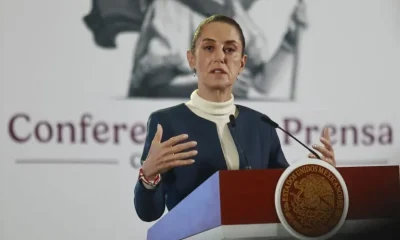International
Canada Tightens Rules for Study, Work Permits in Major Immigration Overhaul

Canada is making notable changes to its temporary residence programs to better regulate the growing number of temporary residents and safeguard the integrity of the system.
The government announced a 10% reduction in the intake cap for international student study permits for 2025, along with more stringent eligibility criteria for work permits.
According to a news release on Thursday, these adjustments aim to align Canada’s immigration policies with its evolving economic and humanitarian needs while ensuring the system remains sustainable and effective.
In a post by Immigration, Refugees, and Citizenship Canada, it was stated, “Today, we announced changes to Canada’s temporary residence programs to better manage the influx of temporary residents, preserve the integrity of our immigration system, and protect vulnerable individuals.”
EDITOR’S PICKS
- School Proprietress Allegedly Killed, Burnt By Son In Delta
- Man Detained for Allegedly Killing Mother, Mutilating Son in Abia
- Fubara Regains Freedom After 11 Days in Captivity
Back in January 2022, the Canadian government introduced a national cap to limit the intake of international students. The latest update, obtained from a news release titled “Strengthening temporary residence programs for sustainable volumes,” revealed additional measures to maintain asylum system integrity, such as partial visa requirements for Mexican nationals and enhanced fraud detection mechanisms.
The government plans to lower the number of international student study permits from 485,000 to 437,000 for 2025 and maintain this cap for 2026. The Post-Graduation Work Permit Program will also be updated to align with immigration and labor market demands.

Work permit eligibility, starting later this year, will be restricted to spouses of master’s degree students in programs lasting at least 16 months, as well as spouses of foreign workers employed in managerial or professional roles, or in sectors facing labor shortages.
Earlier in 2024, Canadian officials disclosed plans to reduce the intake of temporary foreign workers, after years of high immigration levels. By 2026, Canada aims to reduce the proportion of temporary residents from 6.5% to 5% of the population. The reforms include tightening work permit eligibility and refining the International Student Program to address economic pressures and enhance system integrity.
FURTHER READING
- Poverty, Hardship: Nigerians Turn To Organ Selling Amid Crisis
- Petrol Price Hike Pushing Nigerians To Breaking Point – NLC, Atiku
- No Mass Resignation Of Soldiers Due To Corruption, Low Morale -Nigerian Army
Minister of Immigration, Refugees, and Citizenship, Marc Miller, remarked, “Not everyone who wishes to come to Canada will be able to, and not all who want to stay can remain. These changes are necessary to maintain a strong, well-managed immigration system that responds to today’s evolving landscape.”
Additionally, Minister of Employment, Workforce Development, and Official Languages, Randy Boissonnault, highlighted that the Temporary Foreign Worker Program was created to address labor shortages that qualified Canadians could not fill. The reforms will now prioritize Canadian workers to meet the economy’s needs.
Key changes include:
- Reducing temporary residents from 6.5% to 5% of the total population by 2026.
- Requiring applicants for Post-Graduation Work Permits to demonstrate a minimum language proficiency in either English or French.
- Introducing a study permit intake cap for 2025–2026, requiring doctoral and master’s students to submit an attestation letter from their province or territory.
- Adjusting the cost-of-living requirement for study permit applicants starting January 2024 to better reflect actual living expenses and prevent exploitation.
Further details on these measures will be released on the Immigration, Refugees, and Citizenship Canada website soon.
Click here to watch our video of the week:
Advertise or Publish a Story on EkoHot Blog:
Kindly contact us at [email protected]. Breaking stories should be sent to the above email and substantiated with pictorial evidence.
Citizen journalists will receive a token as data incentive.
Call or Whatsapp: 0803 561 7233, 0703 414 5611















